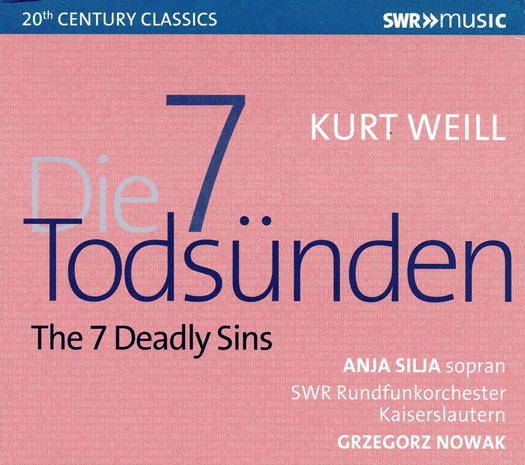 VIDEO PODCAST: Come and meet Eric Fraad of Heresy Records, Kenneth Woods, musical director of Colorado MahlerFest and the English Symphony Orchestra and others.
VIDEO PODCAST: Come and meet Eric Fraad of Heresy Records, Kenneth Woods, musical director of Colorado MahlerFest and the English Symphony Orchestra and others.
- Piermarini Hall
- Gian Carlo Menotti
- Halina Czerny-Stefanska
- Djevdet Gajiev
- Franz Clement
- Christiane Karg
- David Chan
- Langgaard: Symphony No 6
 VIDEO PODCAST: New Recordings - Find out about Adrian Williams, Andriy Lehki, African Pianism, Heinrich Schütz and Walter Arlen, and meet Stephen Sutton of Divine Art Recordings, conductor Kenneth Woods, composer Graham Williams and others.
VIDEO PODCAST: New Recordings - Find out about Adrian Williams, Andriy Lehki, African Pianism, Heinrich Schütz and Walter Arlen, and meet Stephen Sutton of Divine Art Recordings, conductor Kenneth Woods, composer Graham Williams and others.

A Timely Resurrection
Music by Kurt Weill,
enjoyed by GERALD FENECH
'Recorded seventeen years ago, this reissue retains its freshness remarkably well, and the performance of both works is delivered with great elegance and elan.'
Kurt Weill (1900-1950) is one of those few composers of the 1920s and 30s whose music is still popular even to this day. He was of German Jewish origin, and the first part of his career played out in Germany, but in his later years he found himself in America. Indeed, in August 1943 he became a US citizen. Still, the most fruitful years were, as indicated above, the 20s and 30s.
In February 1924 the conductor Fritz Busch introduced him to dramatist Georg Kaiser, with whom Weill had a lasting partnership resulting in several one-act operas. At Kaiser's house, the composer met the famous singer/actress Lotte Lenya in the summer of 1924. The couple were married twice in 1926 and 1937 (following their divorce in 1933). Despite this stormy relationship, Lenya gave her husband great support, and after his death she formed the Kurt Weill Foundation and worked indefatigably to increase awareness of his music.
Initially, Weill had moderate success with his first mature non-stage works, but he soon found his true calling, that of the song, of which he wrote a substantial number, and the musical theatre. In 1927 he met Berthold Brecht. This encounter proved pivotal in Weill's musical career, as this famous writer and playwright inspired the composer to write some of his most enduring stage-works. More or less of an age, both were passionately keen to modernise the theatre and soon enough, their first collaboration, the singspiel Mahagonny was out that same year to great critical acclaim.
Other hits soon followed; The Threepenny Opera (1928), The Rise and Fall of the City of Mahagonny (1929) and the Berliner Requiem, also a 1928 piece that displayed the diversity of ideas of this artistic duo. In 1930 Brecht turned to Marxism and this spelled the rupture of their artistic union. Unbearable personal and political differences induced both men to part ways, and by 1931 the Weill/Brecht tandem had come to a halt.
But fate had a surprise in store. In 1933, when both had found themselves in exile because of their Jewish roots, they came together again, this time for the last fling. Commissioned by George Balanchine, the great choreographer, they created the choral ballet The Seven Deadly Sins in only two weeks. The piece, somehow, never attained the popularity of previous undertakings, and although it contains some truly imaginative music, its performances are reserved for the rare occasion.
Listen — Kurt Weill: Anger (The Seven Deadly Sins)
(track 4, 0:00-0:54) © 2002 SWR Media Services GmbH,
2019 Naxos Deutschland Musik & Video Vertriebs-GmbH :
The work is a parable based on the petty morality of the middle classes. Anna is sent to America to earn money for the family home. The conflict between conventional morals and immoral behaviour in favour of material gains is exposed in all its futility. Brecht and Weill depict the seven deadly sins as virtues - those same virtues regarded as sins by the middle class, simply because this sector of society does not possess enough freedom to wallow in 'sin' themselves.
Listen — Kurt Weill: Lust (The Seven Deadly Sins)
(track 6, 3:07-4:01) © 2002 SWR Media Services GmbH,
2019 Naxos Deutschland Musik & Video Vertriebs-GmbH :
The commission for the ballet-pantomime Zaubernacht (Magic Night) most probably came Weill's way through Philipp Jarnach. The premiere took place on 18 November 1922 in a performance for children. In this early but attractive work which Weill wrote during his studies in Berlin, the composer already displays melodic and harmonic touches that later were to characterize his personal style.
Listen — Kurt Weill: Molto agitato (Quodlibet Op 9)
(track 13, 5:34-6:30) © 2002 SWR Media Services GmbH,
2019 Naxos Deutschland Musik & Video Vertriebs-GmbH :
Recorded seventeen years ago, this reissue retains its freshness remarkably well, and the performance of both works is delivered with great elegance and elan. The great Anja Silja, in particular, brought some great memories back of her consummate artistry and delectable purity of tone and line. A timely resurrection, as Weill recordings have dried up of late, although the discography is not one to grumble about.
Copyright © 22 July 2019
Gerald Fenech,
Gzira, Malta

CD INFORMATION - KURT WEILL: THE SEVEN DEADLY SINS


